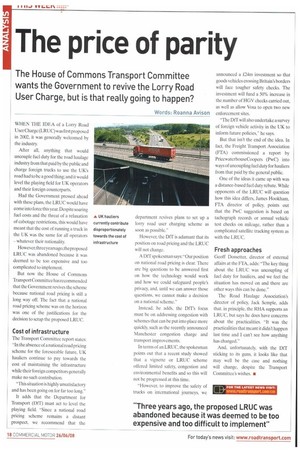11..)
Page 18

If you've noticed an error in this article please click here to report it so we can fix it.
VYI
II The price of parity
The House of Commons Transport Committee wants the Government to revive the Lorry Road User Charge, but is that really going to happen?
WHEN THE IDEA of a Lorry Road User Charge (LRUC) was first proposed in 2002, it was generally welcomed by the industry.
After all, anything that would uncouple fuel duty for the road haulage industry from that paid by the public and charge foreign trucks to use the UK's road had to be a good thing; and it would level the playing field for UK operators and their foreign counterparts.
Had the Government pressed ahead with these plans, the LRUC would have come into force this year Despite soaring fuel costs and the threat of a relaxation of cabotage restrictions, this would have meant that the cost of running a truck in the UK was the same for all operators whatever their nationality.
However.threeyearsago,theproposed LRUC was abandoned because it was deemed to be too expensive and too complicated to implement.
But now the House of Commons Transport Committee has recommended that the Government revives the scheme because national road pricing is still a long way off. The fact that a national road pricing scheme was on the horizon was one of the justifications for the decision to scrap the proposed LRUC.
Cost of infrastructure The Transport Committee report states: "In the absence of a national road pricing scheme for the foreseeable future, UK hauliers continue to pay towards the cost of maintaining the infrastructure while their foreign competitors generally make no such contribution.
"This situation is highly unsatisfactory and has been going on for far too long.
It adds that the Department for Transport (DfT) must act to level the playing field. -Since a national road pricing scheme remains a distant prospect, we recommend that the department revives plans to set up a lorry road user charging scheme as soon as possible."
However, the DfT is adamant that its position on road pricing and the LRUC will not change.
A Dfr spokesman says: "Our position on national road pricing is clear. There are big questions to be answered first on how the technology would work and how we could safeguard people's privacy, and, until we can answer those questions, we cannot make a decision on a national scheme."
Instead, he adds, the DfT's focus must be on addressing congestion with schemes that can be put into place more quickly, such as the recently announced Manchester congestion charge and transport improvements.
In terms of an LRUC, the spokesman points out that a recent study showed that a vignette or LRUC scheme offered limited safety, congestion and environmental benefits and so this will not be progressed at this time.
"However, to improve the safety of trucks on international journeys, we announced a £24m investment so that goods vehicles crossing Britain's borders will face tougher safety checks. The investment will fund a 50% increase in the number of HGV checks carried out, as well as allow Vosa to open two new enforcement sites.
"The DtT will also undertake a survey of foreign vehicle activityin the UK to inform future policies," he says.
But that isn't the end of the idea. In fact, the Freight Transport Association (FTA) commissioned a report by PricewaterhouseCoopers (PwC) into ways of uncoupling fuel duty for hauliers from that paid by the general public.
One of the ideas it came up with was a distance-based fuel duty rebate. While opponents of the LRUC will question how this idea differs, James Hookham, FTA director of policy, points out that the PAPC suggestion is based on tachograph records or annual vehicle test checks on mileage, rather than a complicated satellite tracking system as with the LRUC.
Fresh approaches Geoff Dossetter, director of external affairs at the FTA, adds: "The key thing about the LRUC was uncoupling of fuel duty for hauliers, and we feel the situation has moved on and there are other ways this can be done."
The Road Haulage Association's director of policy, Jack Semple, adds that. in principle, the RHA supports an LRUC, but says he does have concerns about the practicalities. "It was the practicalities that meant it didn't happen last time and I can't see how anything has changed.
And, unfortunately, with the DfT sticking to its guns, it looks like that may well be the case and nothing will change, despite the Transport Committee's wishes. •








































































































































































